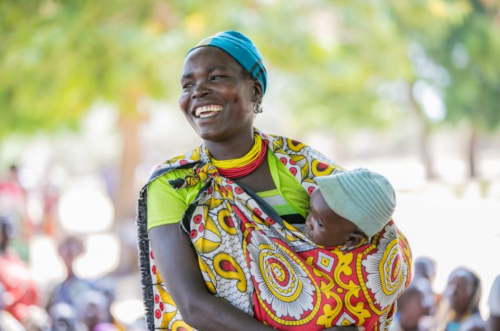The Global Coalition for Social Protection Floors, the ILO and UNICEF join forces to expand social protection for all through sustainable financing
Joint programme on improving synergies between social protection and public finance management
The European Union, Global Coalition for Social Protection Floors, the International Labour Organization (ILO) and UNICEF presented an innovative partnership on social protection and public finance management, on December 1st.

A mother awaiting immunization of their children at Nabilatuk H/C IV, Kaabong District. Uganda
The multi-country EUR 22.9 million programme – supported through funding from the European Union – was developed in collaboration with eight partner countries including Angola, Burkina Faso, Cambodia, Ethiopia, Nepal, Paraguay, Senegal, and Uganda. It supports the development of more inclusive, robust and sustainable social protection systems that can also respond to future shocks. This new partnership provides integrated support to national ministries and public agencies on the planning, design, financing and implementation of social protection systems, programmes and delivery mechanisms.
Social protection is a human right, and an investment with high social and economic returns– yet more than half the world’s population do not have access to any social protection, and coverage remains particularly low for vulnerable groups such as children, persons with disabilities, women and men who work in the informal economy and migrants.
A key barrier to expanding social protection is the lack of adequate and sustainable financing. A recent ILO report estimates that developing countries would need to invest an additional USD 1.2 trillion– equivalent to 3.8 per cent of their average gross domestic product (GDP) annually – to close the massive social protection financing gap and ensure minimum income security and access to health care for all.
“Closing these gaps is both necessary and achievable. With concerted political will, we can make this happen and make social protection a reality for all” said Shahra Razavi, Director of the ILO’s Social Protection Department.
The current COVID-19 pandemic and socio-economic crisis demonstrate the relevance and timeliness of the programme on social protection and public finance management. With the pandemic set to push up to 150 million people into extreme poverty, and 150 million children into multidimensional poverty, it is more important than ever to strengthen and scale up social protection systems, to cushion the impacts of the crisis on workers and their families, and to ensure an inclusive recovery for all.
According to the ILO’s latest global estimates, employment has declined significantly, as measured by a 17.3 per cent reduction in working hours for the third quarter of 2020 compared with the last quarter of 2019. This is equivalent to the loss of 495 million full-time jobs. Among the most vulnerable are the almost 1.6 billion informal economy workers who are significantly impacted by lockdown measures and/or working in the hardest-hit sectors.
To respond to the socioeconomic fallouts of the COVID-19 pandemic, many countries enacted social protection responses to support workers, children and families. However, these are, for the most part, ad hoc measures of short duration. It is time to build on these experiences to turn the short-term measures into long-term social protection systems for all.
“The sheer scale and depth of financial hardships brought on by the pandemic are set to reverse years of progress in reducing poverty, especially among the most marginalized children and communities. Investments to strengthen and expand the coverage and adequacy of social protection systems are critical to reverse these trends and ensure a sustainable recovery and avert a lost generation”, said UNICEF Associate Director and Global Chief of Social Policy Natalia Winder-Rossi.
In Angola for instance, the project supports a coordinated national dialogue for the formulation of the social protection policy with concrete costing and sustainable financing options; in Cambodia, the project contributes to the development of an Integrated Family Package of cash transfers, with the aim of expanding the coverage and adequacy of the social assistance delivery across life cycle. In Paraguay, the project supports the implementation of the Social protection system ¡Vamos! by providing technical assistance to the Government in public finance management and resource identification for social protection. In addition to the eight partner countries, other countries can request shorter-term advisory services to increase performance of their social protection system and related financing options.
The programme will contribute to increasing public investments in social protection by linking the efforts deployed by the EU and other international organizations to strengthen partner countries’ public finance systems and capacities to increase domestic resources for social protection.
The programme will also contribute to investing better in social protection systems by creating a common roadmap and improving coordination between ministries of finance, technical ministries, social partners and the civil society on policy issues of social protection and public finance.
“We will work closely with national civil society organizations and trade unions to ensure their meaningful participation in social protection dialogues and decision-making processes. As increased social protection financing is built on inclusive dialogues and country-ownership, we hope that the programme will set an example for a new collaborative way of working”, said GCPSF Bart Verstraeten.
In addition to supporting inclusive response and recovery amidst the COVID-19 crisis, the project will also contribute to the achievement of the Sustainable Development Goals 1 and 10 on poverty and inequality reduction, and the broader Agenda 2030, including goals on gender equality, access to health, education and decent employment and inclusive institutions at all levels.
Source: United Nations International Children's Education Fund
- 240 reads
Human Rights
Ringing FOWPAL’s Peace Bell for the World:Nobel Peace Prize Laureates’ Visions and Actions

Protecting the World’s Cultural Diversity for a Sustainable Future

The Peace Bell Resonates at the 27th Eurasian Economic Summit

Declaration of World Day of the Power of Hope Endorsed by People in 158 Nations

Puppet Show I International Friendship Day 2020

